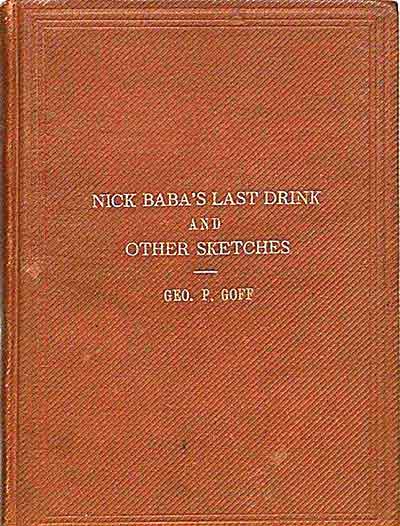
The Project Gutenberg EBook of Nick Baba's Last Drink and Other Sketches, by George P. Goff This eBook is for the use of anyone anywhere at no cost and with almost no restrictions whatsoever. You may copy it, give it away or re-use it under the terms of the Project Gutenberg License included with this eBook or online at www.gutenberg.org Title: Nick Baba's Last Drink and Other Sketches Author: George P. Goff Release Date: June 5, 2006 [EBook #18509] Language: English Character set encoding: ISO-8859-1 *** START OF THIS PROJECT GUTENBERG EBOOK NICK BABA'S LAST DRINK AND *** Produced by Stephen Hope, David Edwards, Sankar Viswanathan, and the Online Distributed Proofreading Team at http://www.pgdp.net (This file was made from images produced by the North Carolina History and Fiction Digital Library)

Pro captu lectoris habent sua fata libelli.
ILLUSTRATED.
Entered according to Act of Congress, in the year 1879, by
Geo. P. Goff,
In the Office of the Librarian of Congress, Washington, D. C.
The kind partiality of indulgent friends having induced me to gather together these scattered fragments, indited as a recreation for my leisure moments, I give them thus collected, with the hope that the same favor will be extended to their imperfections as has so often been shown to their author.
| PAGE. | |
| NICK BABA'S LAST DRINK. | 11 |
| TRIP TO CURRITUCK—Illustrated. | 25 |
| HAUNTED ISLAND. | 51 |
| LEGEND OF BERKELEY SPRINGS—Illustrated. | 76 |


t was Christmas Eve, and the one narrow main street of a small country town was ablaze. Extra lights were glowing in all the little shops; yet all this illumination served only to make more apparent the untidy condition of the six-by-nine window panes, as well as the goods therein. Men and women were hastening homeward with well-filled baskets which they had provided for the festive morrow. All the ragged, dirty urchins of the village were gathered about the dingy shop windows admiring, with distended eyes and gaping mouths, the several displays of toys and sweetmeats.
Their arms buried quite to their elbows in capacious but empty pockets, they cast longing looks and wondered, as they had no stockings, [12] where Santa Claus could put their presents when he had brought them. To all this show and preparation there was one exception: one place shrouded in total darkness—it was the shop of Nick Baba, the village shoemaker. That was for the time deserted; left to its dust, its collection of worn-out soles, its curtains of cobwebs, and its compound of bad, unwholesome odors. This darkness and neglect was about to end, however, and give place to a glimmer of light.
Nick now came hurrying in and, quickly striking a light, placed between himself and a flickering oil lamp a small glass globe filled with water. He sat down upon his bench and commenced work in earnest on an unfinished pair of shoes. He hammered, and pulled, and stretched, and pegged, and sewed, and all this time, had there been any one present, they might have observed that, though Nick worked so diligently, he was unhappy, and a prey to the bitterest reflections. All in the village had commenced their merry-making, while he sat there alone, forgotten, and in despair. His neighbors had plenty—he was penniless, and could take nothing to his home [13] but regrets for the past. The rickety old door now creaked on its rusty, worn-out hinges, and admitted a creature as strange looking as it was unexpected. It moved straight toward Nick, and perched itself upon a three-legged stool close beside him. This mysterious thing could not be pronounced supernatural, and yet it was as unlike anything human as is possible to imagine. It was more like some fantastic figure seen in a dream—the creation of a disordered brain. It may be that it was a goblin—Nick thought it one. It was only about two feet high; a mass of dark-brown hair streamed down its back, partially concealing a great hump, and thence flowed down to its heels. Its head was round as a ball and topped out by a velvet cap of curious shape and workmanship, with a broad projecting front which shaded a pair of lustrous red eyes, set far back beneath the forehead—almost lost there. Its breast was sunken, and the head settled down between the shoulders, created an impression of weakness, as if, for example, it should speak, that a small piping voice would come struggling up from below. Baba looked up with alarm, but the goblin greeted him with a smile, and said, "Merry Christmas, Nick," in a [14]deep, strong and not unmusical voice, which came boldly up and out from its parted lips.
"How do you know my name?" inquired the cobbler, "and why do you mock me by such a greeting?"
"Baba, my friend," replied the Goblin, "I was just thinking that if all the acts of your life had been as good and as humane as your mechanical skill is perfect, you would not now be floundering in the meshes of vice and dissipation. You are making a good pair of shoes there."
The shoemaker worked away without raising his head, but responded spitefully, "Where is the use of making them good?—I get no pay for them."
"Why, who," inquired the occupant of the three-legged stool, "is so ungenerous as to want such shoes without paying for them?"
"They are," answered the busy workman, "for the owner of this miserable shanty, and he complains because I am only six months behind with my rent—a most unreasonable man. If he does not get his shoes to-morrow, he will turn me out; I must have [15]some place to work, and so am forced to do the bidding of this grasping landlord."
"Ah, it is you who are unreasoning," exclaimed Baba's visitor, sorrowfully; "it is you who are in fault. If you would but remain away from the tavern and the vile associates whom you meet there, all would be well with you, you might redeem yourself."
Nick felt this rebuke so very keenly that he turned savagely toward the one who had dared to tell him so plainly of his degradation, and demanded. "Who are you, and why have you disturbed the quiet of this mean hovel to insult me in my misery?"
"Because I wish to serve you," answered it of the waving brown hair.
"You cannot serve me. I will drive you out," threatened the now infuriated cobbler; "I will throw you from the window—I will kill you."
The red eyes of the Goblin danced and twinkled in their caverns; a merry, careless laugh came bubbling forth as it answered, "I will not leave your shop, nor will you throw me from the window, nor yet kill me, Nick Baba. Why, you silly fellow, the sharpest tool[16] on your bench cannot draw blood from me, and that blackened lapstone, if driven with all the force of your great arm through my seeming substance, would leave me sitting here still, not to mock, but to try and save you."
The baffled and stricken shoemaker looked up and muttered. "Then you are not human, you are a demon. But, after all," added Nick, softening, "whether you are of this world or of some other, you are right in what you say."
The Goblin made no reply, and Nick continued, "I have sunk very low, indeed, but I cannot shake this habit; it clings to me so firmly, that I have not only forfeited the regard of my neighbors and friends, but I even loathe myself."
"Why not make an effort, Nick? You can if you will."
"Yes, yes," responded Nick, "it is easy enough to say give it up, but you have never felt this accursed appetite for strong drink; this constant craving for more; this inward sinking sensation, as if the parts of the body were about to separate, impelling the victim [17]on in a career of sin and shame. You know nothing of all this."
"No, I confess I do not," acknowledged the Goblin, "but I think any man may resist it, if he will make the trial."
"Ah, you might as soon expect," pursued Nick, "to see the starving man cast bread from him, as to hope for the drunkard to resist liquor when the frenzy of this appetite is on him."
"But you have not tried, Nick."
"Yes, I have tried and failed, and tried again and then failed."
"Keep on trying," said velvet cap.
"A glass of liquor," resumed Baba, "is a trifling thing, and it is very easy, you think, to cast it into the gutter. But I tell you, whoever and whatever you are, that this sparkling and seductive drink is the pygmy that binds the giant to the post with a thread, and lashes him with thongs of fire.
"Try again," urged the Goblin, "I am sure you can regain all that you have lost."
"No, no," moaned Nick, "I am too low down; I am an absolute slave to rum."
"Baba," commanded the Goblin, "take up the shoe you have nearly finished, look into the sole and tell me what you see there. It is a mirror of the past."
Nick took the shoe from the floor and gazed at it intently for a few seconds. He was agitated, and his powerful breast heaved as only a strong man may be moved—he wept.
"What do you see? Speak!" said his tormentor.
"I see," responded Nick, mechanically, "a scene of seven years ago. It is the image of a fair-haired, blue-eyed girl before the altar in her wedding garments. I am there also, vowing to protect her; to stand up and battle with the world for her; to be a barrier between her and want. But I have not done it—I have been recreant to every principle of honor or manhood, God help me."
"Now, Nick," said the conjuror, persuasively, "pick up the other shoe and tell me what you see there. That is a mirror of the present."
"I see," groaned Nick, "in place of that fair-haired [19] girl at the church, then all happiness, a prematurely old woman, faded and disheartened. Three ragged children cling to her scanty clothing. They beg of her mere bread to keep off hunger. She has none to give them—she draws them closer to her, and folding them in her emaciated arms, kisses them. She gives them all she has—a mother's love."
"What more do you see," demanded the magician: "tell it all."
"Oh! maddening sight," sobbed Nick; "I see myself staggering from the ale-house and reeling into what should be a home, where gaunt starvation stalks the floor; where the hearth is fireless, and where a starving family die upon a pallet of straw."
"You have seen it all," said the wizard. "It is bad."
"Yes, and the picture is as true as it is terrible. What demon prompted you to come here to-night with your diabolical machinery, to show me to myself so much blacker than I thought I was?"
Nick's queer little companion peered through the misty, uncertain light of the cobbler's workshop with his sharp restless red eyes, but remained quiet.
Nick, his head in a whirl of excitement, then placed his face in his open palms, and resting his elbows upon his knees, looked down at the floor covered with scraps of soiled leather. Soon these scraps commenced to move and assume weird shapes. They changed to hundreds of little red, blue and green devils, no more than a few inches high, which capered over the floor in troops. They ran up Nick's back, and hiding in the mass of black hair, twisted and knotted it until their victim winced, and then with hilarious shouts dropped to the floor and went clattering away. Returning, they played hide and seek in and out of the old worn boots and shoes which littered the floor. Then the tub wherein the shoemaker wet his leather, burst its hoops and the water ran out over the floor in streams of fire. The light was out and darkness enveloped Nick and his companion. The wind went howling by, and flung gusts of hail against the cracked and broken windows. Baba, shivering from the cold, straightened himself up and looked for his patron.
He could not see him, but he did perceive two balls of fire close to him—the red eyes were still upon him.
Nick was thankful even for this, as any companionship at that moment was better than none. The silence was at length broken by the Goblin remarking, "You must have passed a fearful ordeal during the last few moments."
"Has the time been so short?" inquired Nick; "it seemed almost an age to me. This is not the first occasion, however, that I have passed through it, and I fear the time may come when nature will break down, and then I shall either do myself an injury or harm some one else—I know it."
"I hope not," said the wizard. "Good-bye, I must go."
"Do not leave," implored the half-frightened Baba, "but remain with me until I have quite finished my work. I believe I am growing to be a coward, for I dare not be alone to-night. You are such an odd-looking manikin," continued Nick, "and have spoken so fearlessly to me, that I am beginning to like you. Do stay."
"Well," consented the Goblin, "I will remain as long as you wish; my time is of no value; beside, if I can persuade you to reform and be a sober man, it will be worth an eternity of waiting."
Nick said, "Thank you, I will try," and went on with his work.
Neither spoke for some time, when Baba suddenly exclaimed, "There, they are finished at last, and are as good a pair of shoes as man ever trod in. I suppose now that I may occupy this den for a while longer."
"Baba, my good man," solicited Nick's friend, "as we are about to part, will you give me your promise never to drink rum again? You will then be happy, I am sure."
Hesitatingly the cobbler agreed that he would not taste the accursed stuff again; but made it a condition that his new-found friend should accompany him as far as where he lived in such wretchedness.
"I have no objection," replied the Goblin, "if you will not walk too fast, for I cannot keep pace with you."
"Why, I will carry you," said the grateful Nick, and seizing the little conjuror in his arms, walked off with him easily.
When they had proceeded about half the length of the street, at the other end of which Nick lived, they came to the village dram-shop. Forgetting all that had passed, [23]the willing shoemaker stopped and listened. He could hear the clinking sound of glasses ringing on the night air, mingled with the maudlin shouts and songs of his boon companions. The old feeling returned; he grew weak in his resolution, and, turning to the Goblin, said, "Just come in and have one drink with me—the last one." Immediately the imprudent Nick was thrown violently to the ground, the houses trembled, and their shutters rattled from their fastenings. The whole town seemed falling into ruins. Nick was startled into wakefulness, and a sweet, cheery voice called, "Nick, Nick, are you going to lie in bed all day? It is a bright Christmas morning and the children are half frantic to show you the presents Santa Claus has brought them."
"My dear, are you sure I am Nick Baba, the village shoemaker, and that you are his wife?"
"Certainly. Why ask such a question?"
"Then I have had a frightfully vivid dream," explained he to his wife, "for I seemed to have fallen back into my old habits of intemperance and to have dragged you down with me, where I had hoped never to see you again."
"Nick, dear, it was but a dream. Remember you took your last drink just three years ago; do you feel strong enough yet to resist it?"
"Yes, I do; and now that I am sure it was only the nightmare, I will hasten and join you and the children at breakfast."


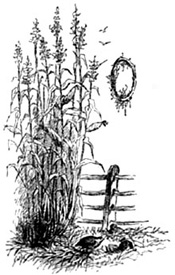
n a Monday, in the month of November, we started on our annual trip to the marshes of North Carolina. We left Washington armed and equipped, and met, at Norfolk, four of our party who had left New York the previous week. They had been spending a few days in Princess Anne County, quail shooting, where they had labored hard with no success to speak of—the birds were few, the ground heavy, and they quit that locality, perfectly willing never to return to it. They arrived in Norfolk heartily sick of that excursion. We got the traps all together [26]and made a start for our favorite sporting grounds; where the merest tyro may do satisfactory execution, and come in at night with a keen appetite for the next day's sport.
While waiting for the quail party to return, we strolled through the old city of Norfolk, with its quaint houses and curiously-winding streets, and wandered into the old-time burial place surrounding St. Paul's church.
This is one of the oldest places of worship in the United States; it was erected before the Revolution, and is built of imported brick, laid alternately, red and black. The figures, giving the date of erection, 1739, are rudely worked into the wall—projecting far enough to make the design perfectly plain. When the town was burnt by the British, 1775, only the walls of this sacred edifice were left standing. The enemy relieved it of a very fine marble baptismal font, and also of the communion plate, which were carried to Scotland. On the gable end of the building, still fast in the wall, may [27]be seen a cannon ball which was fired from the British ship, Liverpool. The church stands in the customary grave yard of those days, and contains the remains of persons interred as early as 1700. Near the door stands the tomb-stone of Col. Samuel Boush, who gave the land on which this house of worship stands. Many of his relatives also rest there. Some of the stones, marking places of interment, are covered with mosses and creeping plants; the inscriptions on others are almost obliterated by the ravages of time; still others have fallen or been broken, and now lean in every direction over the last earthly resting-place of those who thought to tell coming generations who reposed beneath. This is one of the weaknesses of mankind, but it is vain.
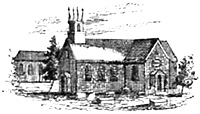
Let them pile up costly and lofty monuments—reaching heavenward; let the artist cut their names and virtues deep into the enduring granite; let the mechanic, with all his skill, set the foundations, yet the lettering will perish and the stone will crumble. Parasitic plants will fasten upon them; beneath their destroying grasp names and dates will disappear, and generations yet to come will be unable to tell whether they look upon the grave of a [28]prince or upon that of a peddler—the narrow house of him who retired to the straw pallet of poverty, will not then be known from that of him who reclined upon the silken couch of affluence—
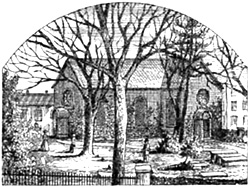
Our party assemble, and we find the little steamer Cygnet at her wharf, looking as neat and trim as the graceful bird after which she is named. Newly painted, she was about to start on the first trip of the season.
Half-past six was the hour of departure, but a heavy wet fog hung over this city by the sea, and we were obliged to await its disappearance. At length the sun struggled through the clouds, and the mist cleared rapidly away. We hauled out and steamed slowly up the Elizabeth River, then past the Navy Yard, with its tall smoking chimneys, its long rows of yellow buildings, its leaning derricks, its neat and trim little square, domineered over by a lordly flag-staff, whose base is guarded by cannon captured from the enemies of the Republic, and its dismantled ships—relics of past naval architecture. As we pass, the shrill cry of the boat-swain's whistle is heard on ship-board, piping all hands to breakfast, mingled with the music of the busy clinking hammers forging chains and anchors. A few miles above this naval station human habitations cease, scarcely a living thing greets the eye—we are in almost entire solitude.
The eagle is seen grandly floating on the air, or poised ready to strike a defenceless animal or crippled bird. The buzzard, of loathsome aspect, perched upon a blasted tree, waits for his gorged appetite to sharpen, that he may descend and fatten upon some putrid carcase. The river, narrow and tortuous, rolls its black waters between low and marshy banks, flat, and running back to thin growths of stunted pines and other badly nourished trees. As we go on, the senses are now and then refreshed by the sight of a clump of pines, which have persisted in growing tall and straight, with tufts of bright green foliage waving gracefully in the wind. For many miles this is about the description of country we pass through.
At Great Bridge we enter the locks of the Chesapeake and Albemarle Canal. A battle was fought here in 1775 and the British defeated. Here are the Company's houses, well constructed and neatly painted—a credit to the corporation as well as to the guiding spirit. The substantial locks and well kept dwellings and offices, like the gilded signs over the doors of the haunts of vice, are pleasant to look upon, but they do not tell of [31]that which is within. If the passage up the river is dismal, what shall we say of the journey through this canal. It is a dreary sameness cut right through a great swamp, merely wide enough to admit the passage of two vessels, with only a dull damp settlement here and there—a country store and the inevitable porch, with its squad of frowsy, unkempt idlers.
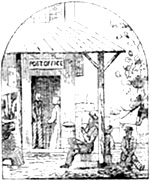
The country store and post-office is the same everywhere: it belongs to every clime and nationality—it is a human device and speaks an universal language. It is generally overflowing with all sorts of commodities, from a hand-saw to a toothpick—is well stocked with calico and molasses, rum and candles, straw hats and sugar, bacon and coal oil, and gun-powder and beeswax. It is the rallying point for all the mischief-making gossips to collect, for the settlement of the affairs of the nation, and, failing in that, to set the neighbors by the ears.
Leaving the canal, we go out into another river: a bright spot breaks upon us—a lumber station with new, [32]fresh-looking piles of sawed lumber. The banks of this stream are just as low, marshy and uninteresting as the one we have passed through, and more crooked. There are perhaps a few more trees—some oaks, and we observed a tree with its crimson and yellow autumn foliage, backed by a clump of pines, looking beautiful against the dark green, like sunlight illumining a gloomy spot.
After winding through the channel for a few hours, we enter Currituck Sound. This shallow sea takes its name from a tribe of Indians which once owned the adjacent lands. It is quite a large sheet of water, though not deep, about fifty miles long, and nearly ten at the widest part. It is dotted with small, low, sedgy islands, marshes and swamps. After enduring the approaches to it, quite an enlivening scene is presented. Persons are seen on the shore of the mainland, and boats are moving about in various directions. Huge groaning windmills, with tattered sails, guard the shore and torture the Indian corn into bread-stuff. Now for the first time the traveler begins to realize what it is to see wild fowl. The water seems black with ducks and geese, and dazzling white with the graceful swans. The latter sit in great flocks [33]on the shoals, for miles in length. As the steamer approaches, they arise in such vast numbers as to nearly blacken the heavens with a rushing sound like the coming tornado. Arriving as near our destination as the vessel can take us, we disembark, landing on a strong platform built far out from the shore. For a half hour we are busy getting our traps from the bait—guns, dogs, ammunition, boxes, bags, bales, bundles, baskets and barrels. We had left nothing unpurchased which could contribute to the comfort of the inner or outer man—especially the former. Now we transfer everything to a small boat, sent from the beach miles away, to meet and convey us to our journey's end—our home for a few weeks, where we must conform to the customs of the natives as near as possible. We do not reach the Hall until the twilight has faded into darkness. The water is too shallow to allow even this small craft to approach the shore near enough to enable us to land, so carts are driven out to it, and the baggage and provisions piled therein. The teams being loaded, us city folks, with store clothes on, are carried ashore on the backs of our amiable and hospitable friends. They have a contempt for [34]dry places, water being their element. Proceeding to the house, we are welcomed in the warmest possible manner by our host and his ever busy and pleasant daughter Nora. We are installed as a part of the family, for we have been there before—we are not strangers. Nora and her sable assistants had prepared an abundant and inviting meal for us, and we enjoyed it with an appetite quickened by the sail across the Sound.
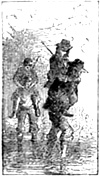
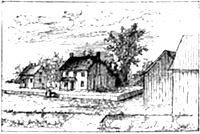
After supper we made our arrangements for the first day's shooting, and then retired—sinking into beds so downy as to induce sleep in a few moments—and we do sleep just as soundly as if we had always been wise and good and happy. The club house, "Raymond Hall," is an ordinary frame one, situated on the shore of the Sound, a few rods from the sea. It is [35]surrounded by a tolerable growth of persimmon and other trees; it stands alone, and at night is as silent as the halls of death—not a sound being heard except the bark of the watchful house-dogs. The wind murmurs about the angles of the house, and through the branches of the trees, in dreary harmony with the roar of the ocean. It is somewhat startling, for a few nights, to us denizens of cities, to notice the entire absence of all precautions against depredators—there are neither locks nor bolts. Life is primitive here; all honor the head of the family, and bow to his will. The people, young and old, are universally kind and respectful to those strangers who sojourn among them, meeting them in a spirit of frankness and exacting the same. We shoot whenever the weather is suitable, and amuse ourselves at other times in various ways—repairing boats, rigging decoys, cleaning guns, loading shell, and making ready for a good day when it does come. We breakfast between eight and nine o'clock, then, donning our shooting attire, including rubber boots, which are indispensable, we go [36]to the landing. Wading out to our boats, laden with all the implements of destruction, we depart for the day's sport. A small fleet of five sail starts in a bunch like a flock of white-winged birds; the swiftest of them shoot ahead, fading out in the distance; others disappear behind the islands or into some of the numerous creeks, and for that day we are lost to each other.
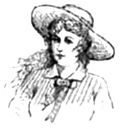
We meet again at night, however, and compare notes. The number of birds each has secured, the good and bad shots, with other events of the day, are all pleasant topics at supper. After the evening meal, we plan the next day's business, and then, wearied, we seek our feather beds and sleep too soundly even to dream. So we pass the days in a sort of luxurious vagabondism. How very pleasant it is to be a vagabond, when one may return to starched linen and the trammels of civilization whenever one wishes!
Our club was composed of six persons: Mondray H. Charles, Rory Theodoric, Jas. O'Kelly, Geo. H. Crege, H. H. Josephus and Geo. G. Paullo. Two servants accompanied the party—Steve and Jacob, Steve is a rattling, roaring fellow, who had never before been without [37]the sound of the breakers of his native Long Island, and was ready to perform any act for his friends, from pitch-and-toss to manslaughter. Jacob, the companion of Steve, is the very opposite in all things; is a genteel fellow, wears a clerical necktie of immaculate whiteness, and has the appearance of having studied for the ministry, and graduated as a cook. His table is a marvel of neatness, and his culinary experience has enabled him to set many a tempting dish before us.
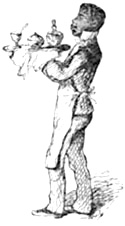
During our stay on the beach many amusing incidents occurred; we will try and give some of them as they return to our memory. It may not be uninteresting to know how and where we shoot, and so we give something of a description. We draw lots for the choice; each selects the point, or island, or strait, which, in his judgment will afford the best shooting for the day, and there builds a blind. This blind is made by breaking down the tall reeds, leaving a fence in front, next the water, to secrete the gunner from the game. [38]Behind this screen a sort of nest is formed by matting down the reeds and marsh grass. It is rendered more comfortable by spreading a rubber blanket, upon which are arranged for use, guns, ammunition, lunch and a bottle—of water. The decoys are placed out in long range, in such a manner as to make them appear as natural looking as possible, and then we are ready for business. Now here they come—a flock of seven geese, plump down among the stool, but get up again with equal haste. Two of them are knocked down with the breech-loader, one dead, the other only wounded—a third stopped by the muzzle-loader. Theodoric was dreamily watching his decoys as they danced about, when a bunch of sprig-tail swooped dawn, hovering above the stool. He picked his bird, and dropped two with the first barrel, and another responded to the discharge of the second. They came tumbling down into the water—dead. One could not [39]easily imagine a duck's head capable of expression, but when they come lively, alight among the dummies, and hear no quack of recognition, they soon discover the fraud, and the frightened haste with which they gather themselves up and attempt to make off, is expression all over.
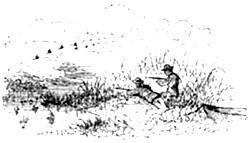
Crege, who is one of the best amateur shots on Long Island, as a medal now in his possession will attest, had taken his number twelve, and walked the marshes for snipe. So far as the ducks were concerned, he had missed the sport, but he brought in a bunch of forty-five English snipe, which compared favorably with the success of the others. Crege is a superior marksman, but he shoots much better when the boys gather about the table at the club on a winter evening, where they talk their shots over again, and trot their horses at impossible speed. O'Kelly is one of the constitutionally chosen Senators for the great State of New York, is a prime [40]shot, an enthusiastic sportsman, and one of the most genial of our friends. He had located on a distant island, and expended powder and shot with his usual prowess—returning laden with game. This was decidedly the best day we had had, and the score was as follows: Charles, nineteen canvas-back, eleven teal, three geese and twelve red-head, mallard and black duck; Theodoric brought in sixty-five birds—canvas-back, red-head, sprig-tail and black-head; O'Kelly, who had had surprising luck, counted fifty canvas-back, and twenty-five common ducks. It was a good count, and the game was hung up in the boat house with the other birds.
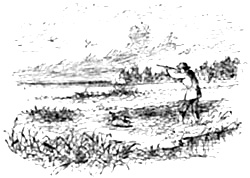
Many of the natives are professional gunners, and haunt the marshes day and night, shooting for market, and thus making a living. If one cannot shoot, one may resort to these people and purchase a boat load. It is, however, a reprehensible practice.
There is no tide in the Sound except that [41]which is caused by the wind, and as high water and a stiff breeze are essential to good sport, it is not possible to have good shooting every day. When the wind comes from the right quarter it makes a full tide, and drives the fowl nearer the shore and up into the creeks where they may feed.
It was getting toward the end of our sojourn; we had experienced several quiet balmy days—no wind, low water, general listlessness. "Should we have any more fun?" we asked, and went to bed. About midnight the wind came howling through the trees, the weather became cold, and the rattling windows responded to the hope of a good day to-morrow. Getting our breakfast early, we selected our points and hastened to the boats. Dark clouds, flying over a dull wintry sky, denoted a steady blow—it was cheering. The blinds were quickly reached, and decoys thrown out. Only a few birds were flying, the fitful wind becoming higher and higher and then dying out entirely. The clouds, however, soon drifted away, the sun appeared as bright and beautiful as summer—almost persuading us to take off our coats. Disheartened at the coquettish nature [42]of the weather, we gave it up. Not a bird to be seen—we took our bottles, and throwing our heads back on our shoulders, tried to look through the bottoms of them—they in turn gave out a gurgling sound of complaining emptiness. We fell into a refreshing sleep; the hours passed away unheeded, until we were awakened by the rustling of the reeds bending in the breeze, whispering of the coveted blow. Heavy black clouds were gathering, and soon old Boreas came cracking out from the right point of the compass.
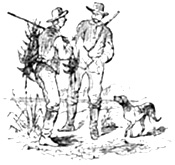
This aroused the ducks in the open water to flight, and they came in, seeking the shelter of the shore—a fatal protection. Charles, the original explorer of the Sound as a sporting place, and founder of the "Raymond Hall" Club, did some good work—taking them, right and left, with each barrel, and dropping single blue-winged teal with unerring aim.
Theodoric is the most amiable, patient friend imaginable; can conduct a bank equal to any man in New York; and we all esteem him very much. He labors under the mild hallucination, however, that he must be constantly doing something, and nearly all this [43]is expended in cleaning his gun. Morning and evening it undergoes this polishing process, and on Sunday he rests himself by giving it another wipe.
"It's a little leaded, you know, George," he remarks, and at it he goes. Human nature may stand this, but guns won't.
On one occasion when he tried to jam a cleaning rod through it, larger than the bore, it refused to go.
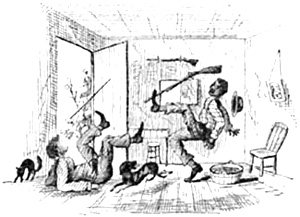
"You won't, won't you," said he, as he raised it aloft and brought it down with all his might on the floor. It went in; but the gun bulged just as any good gun will do, and the eruption yet stands on the barrel, a monument of his determination.
Steve was called in, and a pulling match ensued. Steve had hold of the gun and Thee firmly clenched the rod. The gun could stand the combined strength of two powerful men no better than it could resist the jamming of the rod, and they parted. Steve went backwards over Mary Rogers, a dog, and took a moist seat in a tub of warm water, which had been prepared for cleaning guns. Steve said the water was hot, while our fastidious friend looked bland, gathered himself up from out a pile of empty shells, mixed with scraps of red flannel and oil-rags, and said "I knew it would come out."
Josephus, the great Canarsie fisherman, is not an enthusiast about gunning, and left his sporting traps at home. He only went down for a few days' fishing, and was prepared to take large numbers of bluefish. Armed with a stout line and squid, he invited us over to see him do it. The ocean was rough, and came rolling up in long heavy swells; the fish were far out at sea. After getting his line arranged to his satisfaction, he took firm hold of it a few feet above the squid; we all looked admiringly on. By a series [45]of dexterous gyrations about his head he sent it flying a hundred feet out into the water—it was beautifully done. Skillfully he hauled it in, hand over hand. The squid followed, as bright and shining as when he had cast it out, but no fish. He made ready again, and with that nonchalant air of a man who feels perfectly sure that he can do just what he wants to, he gave it that preparatory whirling motion again, and away it went.
The best efforts will fail sometimes, and the most skillful are often doomed to disappointment—it was so in this case. The hook did not go for a blue fish, but fastened itself in the leg of a too confiding dog that stood looking curiously on, just as those canine friends of man so often do. The misguided animal went howling away, and had to be captured and the hook extracted.
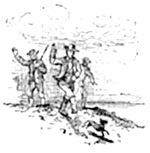
He felt sure he could do it, however, and he tried it again, with as much preparation as before, and twice the determination; he missed the sea altogether, and the barbed instrument buried itself into that portion of male wearing apparel that comes in contact with the chair, [46] when one indulges in that agreeable and refreshing posture of sitting down: they will need repairing.
Paullo is a good shot—with a knife and fork—and can look on at others who are doing hard work, with more nerve and complacency than any man who visits the Sound. He had been persuaded to go to a certain pond where ducks were abundant and easy to shoot. This was good; he put his decoys out and waited. A bird was coming down—it went among the stool. It was a beautiful specimen of the feathered tribe, with a bill like a crow. In some places it is known as a crow duck, but the proper local name here is "blue-peter." Blue-peter seemed to have no fear, but sported around and among the dummies, and tossed the bright drops of water from its shining plumage. With the true feelings of a sportsman, Paullo wanted the bird to have a fair chance, and so tossed bunches of marsh grass at it—it would not fly. Picking up his gun he fired, wounding several decoys.
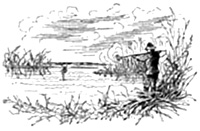
The battle raged all that day and the next, blue-peter [47]diving at the flash of the gun, and defiantly coming up and wailing for it to be reloaded.
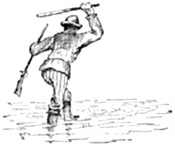
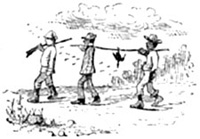
On the morning of the third day, our Nimrod was late. When he arrived, the duck was there patiently waiting to renew the fight, and was busily engaged picking the shot from the bottom of the pond, tossing it up and catching it in its bill as it came down. With such a gunner and such game, this might last a week. Strategy was resorted to, and when blue-peter went under at the flash, our hero waded out and struck it with a club as it came to the surface. The victory was not to the duck. Late that evening Steve and Jacob were seen carrying from the landing to the house the dead B. P., strung by the neck to the centre of a ten-foot pole, one pall-bearer at each end, and the conqueror leading the procession. On his arrival he was greeted by his [48]fellow members with that distinguished consideration which our people so freely accord to actors of great deeds.
We remained on the beach four weeks, and had many pleasant days. We have now returned to our respective homes, wearied in body but refreshed in mind, well pleased with our trip, with each other, and with a decided inclination for a repetition of the jaunt.
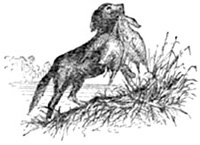
We cannot leave the subject without paying tribute to our friend and companion, Joe Creed. Joe is a large resolute dog of an amiable disposition, a dirty yellow coat, and a small bright eye of the same color. He has a keen sense of duty, but never leaves the blind until he sees the game falling, when he proceeds to bring it in. He was undoubtedly born for it. If two birds fall, with almost human intelligence he gets both. Taking the farthest first, stopping on his way in to pick up the other, he come[50]s in with one swinging on each side of his great shaggy head. They tell of him that he has been caught stealing sheep. We do not believe it—it is a mistake; he may have been in bad company, that is all. Joe was the property of a gentleman on Long Island, and we trusted his exploits in the North might vie with his achievements in the South.
But Joe came to an untimely end; he was found shot to death. The following was placed over his grave:
"Near this spot
Are deposited the remains of one
Who possessed beauty without vanity,
Strength without insolence,
Courage without ferocity,
And all the virtues of man without his vices."
Born in North Carolina, March, 1875.
Died at Jamaica, Long Island, March, 1876.
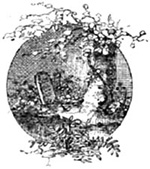

ar up the Potomac, in the shadow of the mountains, among the hundreds of small islands which dot the river in that picturesque region, is one which has the reputation of being haunted. It is but a few miles above the ferry at the Point of Rocks, and is unknown to the thousands of persons who are whirled past there every year in the railroad trains.
This island is about fifty acres in extent, and is bordered with stately oaks to the very river's edge—whose waters lave their roots; its margin is paved with pearly pebbles, while the drooping branches of the trees, festooned with tangled vines of every hue, hang down in glorious clusters, toying with the blue stream [52]which runs beneath. The scenery here is truly enchanting. Islands of every size seem floating in a charmed atmosphere; to pass one pleasing spot is but to disclose another more beautiful than the last. Some are covered with a forest growth; others cultivated, and waving in the summer breeze with yellow ripening grain; and yet others are overgrown with varied shrubs, filled with singing birds, and wild flowers breathing perfume.
I had been fishing—had fished the river from the ferry up above and around the island. I was well satisfied with the day's sport, and was sitting in the stern of the boat in a sort of day dream. Jasper, my boatman, was gently guiding the little vessel to keep it from striking the many projecting rocks, as well as to prevent it from gliding too rapidly down the current. The river, changed to a dark green color, from the reflected foliage, ran now deep and sluggish against the huge boulders which stand defiantly up: now over shallow places, shining with silver sand, fretting itself into white foam and flinging up jets of spray as if in anger. Waking from my reverie, I said:
"Jasper, that is a tranquil-looking island; to whom does it belong?"
Jasper shook his woolly head as if he were puzzled, and with the air of a person about to impart some awful secret, replied:
"Dat don't belong to nobody; dat's haunted."
"Haunted, Jasper! that is impossible. There are no such things as haunted places."
"Well, massa," he replied, his faith still unshaken, "dat's what I was tole long, long years ago when I was a chile. Ye could hear noises comin' fum da like distress, and dem sounds war jined wid de talkin' ob men."
"Very likely, but such sounds came from persons on the island, and they were living, just as you and I are."
"Dar war sounds," answered my boatman, "but da warn't no people on dat island. Dem sounds warn't ob dis world."
Such an opinion could not be weakened, for my dusky companion had been raised in this local superstition and it was as firmly rooted as was his faith in future forgiveness, and so I merely inquired:
"Is there a house there, Jasper?"
"Yes sar," said he, promptly, "da am a big squar one right in de middle ob it."
"We must go and see what it looks like, and try to learn where those sounds came from."
"S'cuse me, massa, dis chile don't set he foot on dat lan', kase ef he do, he neber leabe it agin."
"Then if you are afraid," said I, tauntingly, "I will go alone; you wait until I return."
"Massa," implored the frightened negro, "don't go; you neber kum back; you is lost."
"Take me as near the shore as you dare go, and leave me there."
"Good-bye, massa; you is lost foreber."
Jasper took up the oar and pushed as near the shore as the shallow water would permit; the keel of the boat grated on the sandy shore. I stepped over the side of the boat and waded close up under the overhanging branches, and forced my way through the dense growth which shut this mysterious place from human sight. My black friend was right; in the centre of the island stood the remains of a large stone mansion, surrounded by what had once been a well-kept lawn. The grass was growing green and rank, mingled with weeds, and both were struggling for the mastery. Broken statues [55]of costly marble and workmanship were lying scattered about; great flower vases, shattered, and green with the mould and moss of years, were covered with weak and flowerless creepers.
The house is a two-story one with windows on every side, or rather openings which had been windows at some former period. The dangling remains of a heavy porch hung over the doorway, ready to fall and crush the first careless intruder, while the massive oak doors stood wide open as if to invite the victim within. The cornice was dropping to pieces, and the woodwork had only the appearance of solidity—it needed but the pressure of a hand to crumble into dust. The walls were yet perfect, for they had been built of irregular sized stones, laid up in cement, and so had outlasted the more perishable parts of this costly structure. Inside the great doors was a wide hall of about twenty feet, and its floors of hard wood had stood the test of time remarkably. On one side of the hall was a room the whole depth of the house; the ceiling was lofty, but the plaster had long since fallen and become mere powder. It was empty; patches of mould had fastened upon the walls, and a damp decaying [56]odor pervaded the air; insects and loathsome reptiles crept over the floor. On the opposite side of the hall were two apartments, but not enough of either remained to divine what had been their uses. In a small back room there yet was to be seen a great open fire-place capacious enough to roll in a good-sized tree; a swinging crane was bolted to the corner of the chimney, supporting hanging hooks, blackened by soot; it had doubtless been the kitchen. Having fully explored the lower part, I proceeded to the upper story. As I mounted the stairs, they groaned under the unusual weight, but were still strong enough to enable me to complete the task I had undertaken. The upper floor was divided into four large chambers. Three of them were given up to decay, and desolation peered from every corner and crevice. Bats had made their nests in and about the broken places, and hung in bunches from the ceiling; the twitter of the young swallows could be heard plainly from the chimneys. I passed on to the fourth room; that was not vacant. Although the sash had long since dropped in pieces, and fragments of glass yet littered the floor, this chamber was occupied; not indeed[57] by any living thing, but by the inanimate remains of a once proudly furnished mansion, and also by yet one other object, which though not living had the power of movement. In one corner stood an old fashioned high-post bedstead, of the finest curled maple, curiously carved and ornamented. A sort of frame held the tops of the posts together, from which still hung threads of costly curtains intertwined with cobwebs, and stained with dust and damp atmosphere. There were no chairs, no tables, but in another corner of the apartment stood an antique writing-desk, with metal handles to the drawers, and brass feet fashioned after the claws of the lion, older than the bedstead which occupied the other corner. Its polish and usefulness had passed away with the grandeur of this silent habitation. Between two of the windows was a space of six feet in width, reaching from the floor to the cornice. This was all occupied by a life-size portrait of a female, which looked as fresh and fair as the day it left the hands of the artist. All else about this solemn place was weird and death-like; there she stood in her loveliness, as if just attired for some merry-making; her rosy lips seemed ready to break out into [58]song and laughter and shout, to startle this ghostly scene.
"What could this mean?" I asked myself. "Why had all the work of man perished, crumbled into dust, and this lovely image not suffered the inevitable decay? Who was she, that she could stand here untouched amid this ruin—defying time? Was it the semblance of the mistress of this once rich abode? Had she loved with more ardor than reason? Was she waiting for some one to enter this doomed edifice that we might tell her story and fulfill her destiny?" I asked myself all these questions over again, as I stood spell-bound, gazing at this beautiful vision. She was symmetry itself; her hair was golden-hued, and flowed in sunny profusion down over her beauteous neck and shoulders; the painter's art had not exaggerated her natural grace and dignity—she was beauty unadorned. The dress was of white satin, with the puffed sleeves and short waist of the last century. A broad pink sash, fastened in front at the waist, reached down to a pair of tiny feet, clothed in rich embroidered slippers. I felt as if I was in the presence of a living human being, and that she might at any moment [59] chide me for breaking the silence of this desolate place—for disturbing its quiet.
With that feeling of superstition which runneth in the blood of man, I shuddered, grew weak and faint; great drops of cold perspiration started out from my forehead, and I turned to see if some supernatural mechanism had not closed the door and entombed me with the lovely phantom. It was still open; its rust-eaten hinges had long since ceased to act. I was free to go, but, with the infatuation of curiosity, I could not move; I stood in my tracks and ventured to look again.
A sound of rustling drapery startled me. Great heavens! this image, which seemed a moment before but a part of the solid wall, had moved and stood in the centre of the room. Slowly she raised her right arm, and with extended finger pointed to the old and faded escritoire. Mechanically my eyes took the direction toward which she pointed. I saw the doors of the cabinet tumble from their fastenings and fall to the floor with a startling crash, while her attitude commanded me, imperatively, to examine the recesses of this sepulchre of a long buried secret. I did so. In it was nothing [60]except a small time-stained memorandum-book, the edges fastened by a silver clasp. I took it up. It contained the following strange story of the Haunted Island. Here it is:
"Married.—On the 27th of May, 1794, at Rock Creek church, in the territory of Columbia, by the Rev. Mr. Rolf, John Othard to Marie Othard."
"John Othard and myself were cousins; we had been brought up beneath the same roof, and been schoolmates and constant companions from childhood. He was my boyish lover and protector. He had grown to manhood, I was a few years younger, and we had vowed eternal constancy to each other. When, however, too late, our parents discovered our fondness for each other, and knew that we were betrothed, they interposed objections; and after exhausting all mild means, they threatened us with their displeasure, said they would disown and disinherit us; that if we persevered, we must be outcast and wanderers—go out from under the paternal roof forever; that the union would be unlawful and wicked. The tie of blood, they said, was too close, and could be fruitful only of misery and ruin—an unhappy, sinful match. [61]We had been walking, John and I, and talking as usual over our doleful fate and prospects, and what seemed to us the absurd notions of our parents. He had been trying to persuade me to disregard what he termed the obstinacy of the old folks, and said impatiently:
"'Come, Marie, when will you consent to be mine? We are old enough to judge of our own affairs. If our families are determined on driving us out with scorn, let us be equally so to convince them how very harmlessly it will fall. I can support you; they may keep their money, and bestow their curses.'
"'No, not yet, John; let this cloud which now hangs over us pass away first; it may, ere long, be dispelled. They may relent, and then, how very happy we shall be to know that we did not court the anger of our relatives. Let us not act hastily.'
"'Ah! my dear Marie, women do not understand these matters quite as well as men. I really think you share their idle superstitions. Do you not?'
"'You may call them superstitions if you will, but my sense of propriety tells me that we should wait. We could not be happy with their malediction pending over us.'
"'That is prattle. Notwithstanding these fears, we may be as prosperous and happy as though we had come from the opposite sides of the earth, and if you consent, they will be compelled to acknowledge it.
"'Our marriage, when solemnized by the proper authorities, will be as far above their idle prejudices as the heavens are above us all.'
"'Still, John, we must wait.'
"'Yes, and wait. Who ever taught us, until it was too late, that we were growing up in sin—if it is sin?
"'Why did they permit the seed of our childish friendship to ripen into the full flower of love, and then blast it with the frost of parental authority?'
"'Dear John, do not lose your temper. I think you are right in that, but let us be brave, and not set aside, too lightly, our duty to those whose only solicitude can be that we do no wrong.'
"'I was a little impatient, to be sure. I will respect your wish, Marie. I will wait, but it must not be here.
"'I will go out into the busy world for a year or two, and then return to claim you. If I do not come back to you rich, I will at least have enough to give us a good start in the world.'
"'John,' I said, placing my hand in his, 'I shall miss you very much, and be very lonely. Be careful, John, that you do not bring with you a wife, to give us a practical demonstration that your love was a mere fancy.'
"'Not I, dearest; I will remain as true to you, through every vicissitude, as I now think you to be true.
"'But you, who knows but I may live to find that you have obviated the trouble by marrying a man who is not your cousin, just to make the theory of certain persons good?'
"'Trust me; I am worthy of your love; and now, good bye. God bless and care for you.'
"'May He bless and protect you, Marie.'
"'He went off that same day. For the first few months his letters to me were frequent, and always filled with sentiments of love and constancy. Then the intervals became longer, and longer, then ceased altogether. 'He is in a large city, I thought, and in the whirl of excitement, he has already forgotten me; some other, perhaps, has taken my place; his heart has another idol. No, I reasoned with myself; that cannot be, he has become very poor and has married for money, thinking I would never relent.'
"'Months passed rapidly away, faded into years, and yet no tidings came. This silence and uncertainty were wearing tear channels down my cheeks. I waited on; and though pained and sickened, like a true woman I never allowed my tongue to disclose the anguish I suffered. The wolf was gnawing at my heart; if the lines I felt growing more marked on my features did not tell the story, it was my secret, and I kept it.'
"'One morning, after an absence of three years, John suddenly made his appearance—without a note of warning. He seemed somewhat older, and his face had lost that impetuous look of boyhood. But he was handsome ever, and just the same loving fellow.'
"'I am so rejoiced to be at home again. I have been thinking of you constantly, Marie.'
"'Why, then, have you been absent so long, and why for two years have you not written to me—not even a line?'
"'I have been fighting in a great, crowded city for a competency. The battle was fierce and long; sometimes I was lost in the busy, swaying multitude; but I have gained it, and I am here to know if you will go and share it with me."
"'Yes, I am ready and willing to go, though I am sure we shall be driven out and away from the family fold; be branded as wantons, outcasts, by all we love most dear.'
"'Leave your fears outside the church door, my darling, for we can defy them so far as money is the question. I have enough. We will build ourselves a home in some retired spot, and be so happy that they will seek us, and be ashamed of their conduct when they see how they have erred.'
"I could not resist such persuasion from the only man I had ever loved. I consented at once, and the next day we were married. In accord with my own desire, we bought this embowered island, and built this spacious home. It had everything in and about it that taste could fancy and wealth purchase. It was quite a heaven for me. We were so happy, and he never left me. We sat beneath the grand old trees and talked of our future prospects, read our favorite books, and I loved those best which we had read together. It seemed too much happiness to last long; sometimes I felt as if the shadow of sorrow was threatening [66] our home. Yet all was serene, and I dismissed my fears. It had not yet come; but it was coming though, as slowly yet as surely as the distant muttering of thunder portends the approaching storm. An indefinable dread of something impending clung to me. I could not rid myself of it. My husband now commenced absenting himself from home. He had business in this city, and then in that one; his journeys became more frequent and of longer duration. After one of these visits he returned wearied and not at all like himself; care was on his brow, and his manner betokened some great grief. I said:
"'John, dear, it is two weeks since you left me, and you promised to return the same day. What is the matter? are you in trouble? You must be, for your face has that pinched look which nothing but extreme anxiety can produce. Confide in me.'
"'Nothing very serious, my dear child,' he replied, 'it will soon be over; only a temporary embarrassment; some unlucky speculations.' Then he gave me a kiss, smiled as he used to do, and said I was a baby.
"'Ah, John, your words buoy me up and make me feel almost happy again.'
"'Let us speak of it no more, and when I have my business all in shape again, I will never leave you, but remain here, where, if you cannot see me every moment, you can hear me.'
"'Oh, that will be such joy for me. But do you know, John, that while I have waited, and waited, to hear the splash of the oars as you crossed from the shore, I have conjured up all sorts of things? Sometimes I have thought that perhaps—'
"'Perhaps what?'
"'That the chains of Cupid had been woven around you during your first absence, and that you might have returned to her who—'
"'Just what a foolish woman always supposes. Why I have been as true to you as the waters of the glorious river, which sweeps past our island home, have been constant in their tendency toward the sea.'
"'I believe it, and now you will pardon me, will you, not?'
"'Of course I do,' he continued; 'and, had I been as faithful to myself as I have been loyal to you, I would not now be suffering the woe you have so plainly seen on my face.'
"'Tell me, dear, for I can guide you out of it—I know I can.'
"'No, not now,' he answered; then he kissed me and walked away.
"Something terrible was coming—I knew it. The curses which had been heaped upon us for disobedience were about to bear fruit. Now, strange, rough-looking men came to see my husband—persons whom I had not seen before. They seemed familiar with him; it was evident, however, that their presence was distasteful to him; he tried to keep them at a distance, he shrank from them. I said I did not like these acquaintances; he replied that they were commercial friends, and must be treated with respect. They had long and mysterious conversations together. They would go to the other shore and return, bringing other companions equally ill-looking.
"One dark night the dip of oars was heard, and as the boat was run upon the pebbly shore, four men stepped briskly out, and laboriously lifted and carried a large, heavy, oblong box, and placed it in the cellar. John said it was merchandise, and must be stored; it was unsalable now, and it was best to keep it until there was a market for it.
"'But, John, why can it not be stored in the city, where it would be at hand when the demand arises for it, and why do these uncouth-looking men bring it at the dead of night? It would have been easier, and certainly more pleasant, to have brought it in the daylight.'
"'My dear little sweetheart,' he turned and said abruptly, 'women know nothing of business matters, and you would not understand me if I explained it all.'
"'You are deceiving me; for it does not require a business education to enable one to guess that there might be something wrong about a midnight transaction such as this.'
"He deigned no explanation, but answered half kindly, half sarcastically, 'Good night; ask no more of your puzzling questions. Take this kiss; you are a little nervous and disturbed in temper, you need rest—go to bed.'
"He dismissed me with another kiss, as he had often done before. It was the first to have a tinge of bitterness to it. I was far from satisfied. What could this occupation be, that required him to remain away so long and gather about him such associates? He had been [70]gone a whole month. Oh, what a weary, unhappy, dreary month that was for me!—I thought it would never end. Why could not the fates let loose their wrath all at once? Why was not all revealed? I wept myself asleep, and was frightened into wakefulness by some horrid dream. I took up the newspaper and tried to read it; the letters all ran together. It was the Alexandria Times and Advertiser, of May, 1798. Instinctively my eyes caught the following notice:
"Counterfeit Dollars. The public are requested to be on their guard with respect to a number of counterfeit dollars of the United States, now passing in this city. They are made of block-tin and pewter, and, if not quite new, may be detected on sight. They are well cast, and, therefore, the impression is exact; but the milling around the edge is nothing like the true dollar, thereby may be easily known. They are about four penny-weights too light."
"The paper fell from my hands. Why I could not tell, and yet the reading of that paragraph seemed connected with my life. Had that box merchandise in it? Had my husband become one of a gang of base money coiners? He could not have [71]fallen so low; he was too good and too honest. That mysterious box was always present, turn which way I would. I felt impelled to go to the cellar and examine it. There could be no harm in merely looking; it would ease my troubled brain. I took the lantern and stealthily groped my way down into the damp earthy atmosphere. It was silent as death there; the dim light revealed nothing but the box. I held the lantern up over it, and the uncertain flickering of its rays fell upon the lid. There was no denying the ownership, it was marked in large bold letters, 'John Othard.' Now, I must know what it contained; I could wait no longer; a sort of determined malice took possession of me to connect it with the newspaper, and with my husband—fiendish thought. I did not desire to prove him other than the pure and noble man I had loved; but I was not myself—I would do it just to still my excited suspicions. Putting the lamp down over the name, as if that could blot it out, I went up the creaking steps, and hastened back with the axe firmly clenched in both hands, as if I feared a rescue. Placing the light on the earth floor, I hesitated whether to strike or [72]not—the blow was to reveal joy or eternal misery to me. To leave the fatal box to itself, and go to my chamber, was to be racked with horrible doubts. I seized again the axe, and with repeated blows splintered the cover; then, with bleeding hands I ripped it off and hurled it from me. Yes, there, wrapped in rolls, shining with damnable brilliancy, was my husband's secret. I was first stunned then frantic; cursed myself and him; wished I had been unable to read; that I had been blind, dead, rather than find him whom I had enshrined in my heart of hearts as a god, so unworthy. He would go to a felon's cell—perhaps to an ignominious death—and me, where could I go? I left the dreadful thing uncovered; as I backed away from it toward the stairway, those glittering witnesses grinned at me. I walked the floor all night—I could not rest. The angel of sleep had fled, frightened at the discord in my frame, and the angel of death was spreading his baneful wings over me.
"Dawn surprised with its unwelcome light, and found me a shivering, crouching wretch. That incestuous love with which we had defied the fates, had now borne its full fruit.
"About mid-day John came home. Despair had cooled me. I handed him the paper and pointed to the notice. I watched his eager face while he read it. He flushed and paled, and raising his eyes to meet mine, asked if I knew all.
"'Yes, I do know all. The box contains base coin. I have seen them. They are there, and will consign you to a prison and me to my grave; that is, if there lives one single, pitying human being, who will take the trouble to heap the sod over a friendless, homeless wretch, as I now am.'
"'Calm yourself, darling; they cannot connect me with it. I will bury it. But few persons know of it, and they dare not tell.'
"He went to the cellar. I could hear him working away and talking excitedly to himself. I approached the steps and listened. He had ceased for a moment, I could hear his heavy breathing. I stepped down a few steps; he turned toward me, coat off; his face grimed with perspiration and dirt, he glared upon me. 'Aha, you come too late; I have concealed it, I am not the owner of it; you cannot prove me guilty.' His mind [74]was wandering; he imagined the officers were come to take him. I moved toward him; a pistol shot, a heavy fall, and he had escaped—so far as human penalty was concerned. Here I was, alone, on this accursed island; even the servants had fled in terror, and left me with the dead body of my husband. His blood ran from the wound, and formed in little pools, which the thirsty black earth drank, and left no stain. Now was I strong with frenzy; the method of madness was on me; I seized the tools, which the suicide had left, and commenced to dig what must now be a grave—wider, and deeper, and longer I dug it; then settled the body into it; and covering it up, heaped and rounded it. I did not mind the work; it was excitement and kept me from dying. I went out into the open air—it was not yet light—the peaceful heavens gave no sign of wrath, and the bright twinkling stars looked down upon this scene of crime, and madness, and suicide, as serenely as they had before the island was changed from a domestic paradise to a pandemonium. I hear him calling, as if from the river; it is a stifled cry for assistance. I must go to him. I can save him, and I—"
The newspaper of that period contained the following:
"The body of a female was found floating in the river at the Great Falls of the Potomac—Unknown."

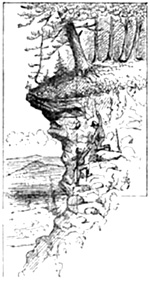
To one who has not lived in a mountain country the abounding beauty of those sequestered regions is unknown. The mountains, blue, dim, and mysterious, with range backing range, and pillaring the heavens, lift their mist-enveloped peaks far above this breathing, thinking world. There the wild deer roams in solitude and security, and there the daring of man has never penetrated. Grim old sentinels, clothed with verdure to their very summits, [77]frown down upon coeval valleys which they protect, and through which they send their bower-born springs with gurgling music to the smiling plains, and onward, broadening into majestic rivers. The valleys, as if conscious of and grateful for the protection, run up to meet and embrace their gigantic guardians, with offerings of wild flowers and many-hued foliage. Afar off a human habitation clings to the side of the steep mount, surrounded by fields of emerald hue; a homestead, hewn from the primeval forest.
Leafless trees, blasted and riven by the angry elements, stretch their scathed limbs for mercy, while their earthless roots writhe like knotted reptiles and twist into hideous shapes. Roads, toiling lazily over steeps, gray, rugged, and rutty, lead away to unknown regions. A bald spot—rock—whose face has borne the violence of the storm for ages, yet defiantly stands there, inviting the fury of its ancient enemy. The clouds, broken into fantastic forms, cast gossamer shadows, which go floating phantom-like, away, as unreal as spirits and as tranquil as the promised land. Jutting crags, piled up in grotesque confusion, capped by monstrous rocky platforms, [78]overhang the leafy depths. The rail track, like a glistening serpent, winds its way along the narrow shore, and over bridges light and fanciful, mere webs, spun by human spiders, spanning streams which foam their anger through narrow passes. Beneath, in a distant valley, the river, like a shining thread, flows on through tangled thickets, past populous towns and lowly huts.
But these mountain solitudes were not always so lonely. Ages gone by, when the world first began, they were peopled by a race of fairies. These little creatures lived and reveled in these grand old forests, and made them joyous with their merry shouts and sports. They knew no care, and nightly gathered beneath the spreading branches, sporting until the gray of morning drove them to their hiding places. They wantoned in the cool streams and swung in the pendant flowering vines, while the moon sent her silvery light down through the trembling leaves to light them on their way. The daylight was hateful to them, and all day long they passed the time in secret bowers and mossy recesses, away from the light, and only left them when the starry heavens bade them forth again to their nightly revels.
Thus, these happy little people lived, and far and near through all the woods, yielded willing allegiance to a queen, majestic, lovely, and beloved by her tribes. Her sway was mild, for mutual kindness was the bond between them. But for a long time her sorrowing followers had noticed that her sweet face wore a troubled look; that she had not as usual joined in their pleasures, nor even approved of them. They felt that some dreadful secret filled her heart and clouded her brow, yet what it was none dared to ask, and she herself remained silent. They would willingly have died to free her from this sorrow, but they knew not what to do. They surrounded her and said:
"Beloved sovereign, may we not share thy grief?"
"It may be, soon," she replied.
"Have we caused you pain? Have we not been dutiful?"
"My sorrow, dear people, is not of your creation; you have ever been loving, faithful subjects."
"What, then, can we do to show our devotion to you?"
"Our season of enjoyment, my subjects, is almost gone, [80]and soon we must hide ourselves to escape the cold. When the spring returns again you shall learn it all; until then seek to know no more."
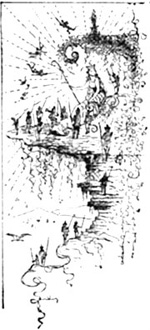
The winter was dead and passed away, and the genial breath of spring wafted silently over his grave, evoking glowing treasures from the ruin he had left. The earth, alive again, put forth its most beautiful creations, and tempted once more the fairies of the mountains to appear. The queen, true to her promise, sent swift messengers to her remotest people; she summoned them all to her presence. They came in troops, and filled the mountain tops and sides, and reached down into the valleys. She welcomed them as they approached her. In majesty she was seated upon a summer throne. It was formed of the finest woods of the forest, and quaintly fashioned by the little work-people. It was cushioned with the most delicate mosses, and wild vines had been trained [81]up and over and around it, blending charmingly with the rustic woodwork. Above her tiny head spread a canopy of delicate twigs, twisted into fantastic shapes by skillful hands, and roofed with the glittering wings of the rarest insects, overlapped with such exactness that not even a drop of dew could penetrate. It was right royal, and she was worthy of it. Near the queen's pavilion were ranged the principal leaders of the various tribes, together with her most favored advisers.
Her eyes, sad and mournful, wandered over this vast assemblage of devoted friends.
"My people," she commenced, "as I promised, I have called you from your sylvan abodes to impart what I have too long concealed. It has been known to myself alone that the period for our allotted stay upon earth has almost expired. In a short time we must go, forever, from these scenes of pleasure—from these woody retreats where we have known so many joys. Our places will soon be taken by the sons of men. It is our fate that when they come we must disappear. Through all our lives we have done nothing but waste our time in pursuit of mere pleasure, hastening the time [82]of our banishment and doing good to no one. Like the bees, fluttering from flower to flower, we will have sipped the sweets of life and left no mark that we ever existed. It is my wish ere we go, that we do something by which we may be remembered.
"Let us bestow upon mankind a gift so great that it shall last them forever, and which they may enjoy and bless us for to the end of time. Such a gift is within our reach, but we have never sought it for ourselves."
With one voice they said—
"What shall it be? The will of our queen is our pleasure."
"I was sure of it," she said. "Now listen: It is known to us all that within this very mountain the purest waters are imprisoned. But we can release them; these crystal streams must be set free from their subterranean channels and brought sparkling to the surface."
They all bowed obedience, and asked when this great task should be commenced.
"Let the preparation for this arduous undertaking go forward," she said, "now while the summer is with us. Waste not the time; let our whole people be employed [83]in making instruments suitable for breaking the crust which confines the treasure we are going to bring forth for the benefit of mankind. We must hasten to our work and be diligent. I dismiss you, but assemble again when next the dreary winter is past and the genial sun warms the buds into leaflets—when the upland rills have found their voices once more, and come leaping from their hidden birthplaces."
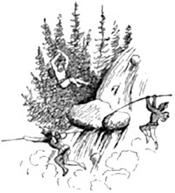
The gentle summer had passed, the winter had again come and gone, and the troops were gathering in response to the command of their mistress. They had been industrious. Each came armed with a stout staff, made from the toughest wood and shod with the hardest flint. In myriads they arrived—whole armies of them—and eagerly awaited the command to go forward. They moved in column, headed by captains, down the steep declivities. They toiled with a will. Many died of fatigue, but their places were soon filled by other eager [84]workers. At length their toil was rewarded, and the bright and beautiful waters gushed forth in great fountains.
The fairies have long since disappeared, but the waters still flow and fill the little valley with sweet, health-giving streams.
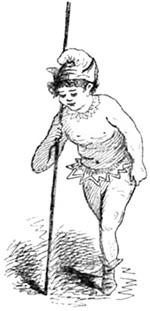
End of the Project Gutenberg EBook of Nick Baba's Last Drink and Other
Sketches, by George P. Goff
*** END OF THIS PROJECT GUTENBERG EBOOK NICK BABA'S LAST DRINK AND ***
***** This file should be named 18509-h.htm or 18509-h.zip *****
This and all associated files of various formats will be found in:
http://www.gutenberg.org/1/8/5/0/18509/
Produced by Stephen Hope, David Edwards, Sankar Viswanathan,
and the Online Distributed Proofreading Team at
http://www.pgdp.net (This file was made from images produced
by the North Carolina History and Fiction Digital Library)
Updated editions will replace the previous one--the old editions
will be renamed.
Creating the works from public domain print editions means that no
one owns a United States copyright in these works, so the Foundation
(and you!) can copy and distribute it in the United States without
permission and without paying copyright royalties. Special rules,
set forth in the General Terms of Use part of this license, apply to
copying and distributing Project Gutenberg-tm electronic works to
protect the PROJECT GUTENBERG-tm concept and trademark. Project
Gutenberg is a registered trademark, and may not be used if you
charge for the eBooks, unless you receive specific permission. If you
do not charge anything for copies of this eBook, complying with the
rules is very easy. You may use this eBook for nearly any purpose
such as creation of derivative works, reports, performances and
research. They may be modified and printed and given away--you may do
practically ANYTHING with public domain eBooks. Redistribution is
subject to the trademark license, especially commercial
redistribution.
*** START: FULL LICENSE ***
THE FULL PROJECT GUTENBERG LICENSE
PLEASE READ THIS BEFORE YOU DISTRIBUTE OR USE THIS WORK
To protect the Project Gutenberg-tm mission of promoting the free
distribution of electronic works, by using or distributing this work
(or any other work associated in any way with the phrase "Project
Gutenberg"), you agree to comply with all the terms of the Full Project
Gutenberg-tm License (available with this file or online at
http://gutenberg.org/license).
Section 1. General Terms of Use and Redistributing Project Gutenberg-tm
electronic works
1.A. By reading or using any part of this Project Gutenberg-tm
electronic work, you indicate that you have read, understand, agree to
and accept all the terms of this license and intellectual property
(trademark/copyright) agreement. If you do not agree to abide by all
the terms of this agreement, you must cease using and return or destroy
all copies of Project Gutenberg-tm electronic works in your possession.
If you paid a fee for obtaining a copy of or access to a Project
Gutenberg-tm electronic work and you do not agree to be bound by the
terms of this agreement, you may obtain a refund from the person or
entity to whom you paid the fee as set forth in paragraph 1.E.8.
1.B. "Project Gutenberg" is a registered trademark. It may only be
used on or associated in any way with an electronic work by people who
agree to be bound by the terms of this agreement. There are a few
things that you can do with most Project Gutenberg-tm electronic works
even without complying with the full terms of this agreement. See
paragraph 1.C below. There are a lot of things you can do with Project
Gutenberg-tm electronic works if you follow the terms of this agreement
and help preserve free future access to Project Gutenberg-tm electronic
works. See paragraph 1.E below.
1.C. The Project Gutenberg Literary Archive Foundation ("the Foundation"
or PGLAF), owns a compilation copyright in the collection of Project
Gutenberg-tm electronic works. Nearly all the individual works in the
collection are in the public domain in the United States. If an
individual work is in the public domain in the United States and you are
located in the United States, we do not claim a right to prevent you from
copying, distributing, performing, displaying or creating derivative
works based on the work as long as all references to Project Gutenberg
are removed. Of course, we hope that you will support the Project
Gutenberg-tm mission of promoting free access to electronic works by
freely sharing Project Gutenberg-tm works in compliance with the terms of
this agreement for keeping the Project Gutenberg-tm name associated with
the work. You can easily comply with the terms of this agreement by
keeping this work in the same format with its attached full Project
Gutenberg-tm License when you share it without charge with others.
1.D. The copyright laws of the place where you are located also govern
what you can do with this work. Copyright laws in most countries are in
a constant state of change. If you are outside the United States, check
the laws of your country in addition to the terms of this agreement
before downloading, copying, displaying, performing, distributing or
creating derivative works based on this work or any other Project
Gutenberg-tm work. The Foundation makes no representations concerning
the copyright status of any work in any country outside the United
States.
1.E. Unless you have removed all references to Project Gutenberg:
1.E.1. The following sentence, with active links to, or other immediate
access to, the full Project Gutenberg-tm License must appear prominently
whenever any copy of a Project Gutenberg-tm work (any work on which the
phrase "Project Gutenberg" appears, or with which the phrase "Project
Gutenberg" is associated) is accessed, displayed, performed, viewed,
copied or distributed:
This eBook is for the use of anyone anywhere at no cost and with
almost no restrictions whatsoever. You may copy it, give it away or
re-use it under the terms of the Project Gutenberg License included
with this eBook or online at www.gutenberg.org
1.E.2. If an individual Project Gutenberg-tm electronic work is derived
from the public domain (does not contain a notice indicating that it is
posted with permission of the copyright holder), the work can be copied
and distributed to anyone in the United States without paying any fees
or charges. If you are redistributing or providing access to a work
with the phrase "Project Gutenberg" associated with or appearing on the
work, you must comply either with the requirements of paragraphs 1.E.1
through 1.E.7 or obtain permission for the use of the work and the
Project Gutenberg-tm trademark as set forth in paragraphs 1.E.8 or
1.E.9.
1.E.3. If an individual Project Gutenberg-tm electronic work is posted
with the permission of the copyright holder, your use and distribution
must comply with both paragraphs 1.E.1 through 1.E.7 and any additional
terms imposed by the copyright holder. Additional terms will be linked
to the Project Gutenberg-tm License for all works posted with the
permission of the copyright holder found at the beginning of this work.
1.E.4. Do not unlink or detach or remove the full Project Gutenberg-tm
License terms from this work, or any files containing a part of this
work or any other work associated with Project Gutenberg-tm.
1.E.5. Do not copy, display, perform, distribute or redistribute this
electronic work, or any part of this electronic work, without
prominently displaying the sentence set forth in paragraph 1.E.1 with
active links or immediate access to the full terms of the Project
Gutenberg-tm License.
1.E.6. You may convert to and distribute this work in any binary,
compressed, marked up, nonproprietary or proprietary form, including any
word processing or hypertext form. However, if you provide access to or
distribute copies of a Project Gutenberg-tm work in a format other than
"Plain Vanilla ASCII" or other format used in the official version
posted on the official Project Gutenberg-tm web site (www.gutenberg.org),
you must, at no additional cost, fee or expense to the user, provide a
copy, a means of exporting a copy, or a means of obtaining a copy upon
request, of the work in its original "Plain Vanilla ASCII" or other
form. Any alternate format must include the full Project Gutenberg-tm
License as specified in paragraph 1.E.1.
1.E.7. Do not charge a fee for access to, viewing, displaying,
performing, copying or distributing any Project Gutenberg-tm works
unless you comply with paragraph 1.E.8 or 1.E.9.
1.E.8. You may charge a reasonable fee for copies of or providing
access to or distributing Project Gutenberg-tm electronic works provided
that
- You pay a royalty fee of 20% of the gross profits you derive from
the use of Project Gutenberg-tm works calculated using the method
you already use to calculate your applicable taxes. The fee is
owed to the owner of the Project Gutenberg-tm trademark, but he
has agreed to donate royalties under this paragraph to the
Project Gutenberg Literary Archive Foundation. Royalty payments
must be paid within 60 days following each date on which you
prepare (or are legally required to prepare) your periodic tax
returns. Royalty payments should be clearly marked as such and
sent to the Project Gutenberg Literary Archive Foundation at the
address specified in Section 4, "Information about donations to
the Project Gutenberg Literary Archive Foundation."
- You provide a full refund of any money paid by a user who notifies
you in writing (or by e-mail) within 30 days of receipt that s/he
does not agree to the terms of the full Project Gutenberg-tm
License. You must require such a user to return or
destroy all copies of the works possessed in a physical medium
and discontinue all use of and all access to other copies of
Project Gutenberg-tm works.
- You provide, in accordance with paragraph 1.F.3, a full refund of any
money paid for a work or a replacement copy, if a defect in the
electronic work is discovered and reported to you within 90 days
of receipt of the work.
- You comply with all other terms of this agreement for free
distribution of Project Gutenberg-tm works.
1.E.9. If you wish to charge a fee or distribute a Project Gutenberg-tm
electronic work or group of works on different terms than are set
forth in this agreement, you must obtain permission in writing from
both the Project Gutenberg Literary Archive Foundation and Michael
Hart, the owner of the Project Gutenberg-tm trademark. Contact the
Foundation as set forth in Section 3 below.
1.F.
1.F.1. Project Gutenberg volunteers and employees expend considerable
effort to identify, do copyright research on, transcribe and proofread
public domain works in creating the Project Gutenberg-tm
collection. Despite these efforts, Project Gutenberg-tm electronic
works, and the medium on which they may be stored, may contain
"Defects," such as, but not limited to, incomplete, inaccurate or
corrupt data, transcription errors, a copyright or other intellectual
property infringement, a defective or damaged disk or other medium, a
computer virus, or computer codes that damage or cannot be read by
your equipment.
1.F.2. LIMITED WARRANTY, DISCLAIMER OF DAMAGES - Except for the "Right
of Replacement or Refund" described in paragraph 1.F.3, the Project
Gutenberg Literary Archive Foundation, the owner of the Project
Gutenberg-tm trademark, and any other party distributing a Project
Gutenberg-tm electronic work under this agreement, disclaim all
liability to you for damages, costs and expenses, including legal
fees. YOU AGREE THAT YOU HAVE NO REMEDIES FOR NEGLIGENCE, STRICT
LIABILITY, BREACH OF WARRANTY OR BREACH OF CONTRACT EXCEPT THOSE
PROVIDED IN PARAGRAPH F3. YOU AGREE THAT THE FOUNDATION, THE
TRADEMARK OWNER, AND ANY DISTRIBUTOR UNDER THIS AGREEMENT WILL NOT BE
LIABLE TO YOU FOR ACTUAL, DIRECT, INDIRECT, CONSEQUENTIAL, PUNITIVE OR
INCIDENTAL DAMAGES EVEN IF YOU GIVE NOTICE OF THE POSSIBILITY OF SUCH
DAMAGE.
1.F.3. LIMITED RIGHT OF REPLACEMENT OR REFUND - If you discover a
defect in this electronic work within 90 days of receiving it, you can
receive a refund of the money (if any) you paid for it by sending a
written explanation to the person you received the work from. If you
received the work on a physical medium, you must return the medium with
your written explanation. The person or entity that provided you with
the defective work may elect to provide a replacement copy in lieu of a
refund. If you received the work electronically, the person or entity
providing it to you may choose to give you a second opportunity to
receive the work electronically in lieu of a refund. If the second copy
is also defective, you may demand a refund in writing without further
opportunities to fix the problem.
1.F.4. Except for the limited right of replacement or refund set forth
in paragraph 1.F.3, this work is provided to you 'AS-IS', WITH NO OTHER
WARRANTIES OF ANY KIND, EXPRESS OR IMPLIED, INCLUDING BUT NOT LIMITED TO
WARRANTIES OF MERCHANTIBILITY OR FITNESS FOR ANY PURPOSE.
1.F.5. Some states do not allow disclaimers of certain implied
warranties or the exclusion or limitation of certain types of damages.
If any disclaimer or limitation set forth in this agreement violates the
law of the state applicable to this agreement, the agreement shall be
interpreted to make the maximum disclaimer or limitation permitted by
the applicable state law. The invalidity or unenforceability of any
provision of this agreement shall not void the remaining provisions.
1.F.6. INDEMNITY - You agree to indemnify and hold the Foundation, the
trademark owner, any agent or employee of the Foundation, anyone
providing copies of Project Gutenberg-tm electronic works in accordance
with this agreement, and any volunteers associated with the production,
promotion and distribution of Project Gutenberg-tm electronic works,
harmless from all liability, costs and expenses, including legal fees,
that arise directly or indirectly from any of the following which you do
or cause to occur: (a) distribution of this or any Project Gutenberg-tm
work, (b) alteration, modification, or additions or deletions to any
Project Gutenberg-tm work, and (c) any Defect you cause.
Section 2. Information about the Mission of Project Gutenberg-tm
Project Gutenberg-tm is synonymous with the free distribution of
electronic works in formats readable by the widest variety of computers
including obsolete, old, middle-aged and new computers. It exists
because of the efforts of hundreds of volunteers and donations from
people in all walks of life.
Volunteers and financial support to provide volunteers with the
assistance they need, is critical to reaching Project Gutenberg-tm's
goals and ensuring that the Project Gutenberg-tm collection will
remain freely available for generations to come. In 2001, the Project
Gutenberg Literary Archive Foundation was created to provide a secure
and permanent future for Project Gutenberg-tm and future generations.
To learn more about the Project Gutenberg Literary Archive Foundation
and how your efforts and donations can help, see Sections 3 and 4
and the Foundation web page at http://www.pglaf.org.
Section 3. Information about the Project Gutenberg Literary Archive
Foundation
The Project Gutenberg Literary Archive Foundation is a non profit
501(c)(3) educational corporation organized under the laws of the
state of Mississippi and granted tax exempt status by the Internal
Revenue Service. The Foundation's EIN or federal tax identification
number is 64-6221541. Its 501(c)(3) letter is posted at
http://pglaf.org/fundraising. Contributions to the Project Gutenberg
Literary Archive Foundation are tax deductible to the full extent
permitted by U.S. federal laws and your state's laws.
The Foundation's principal office is located at 4557 Melan Dr. S.
Fairbanks, AK, 99712., but its volunteers and employees are scattered
throughout numerous locations. Its business office is located at
809 North 1500 West, Salt Lake City, UT 84116, (801) 596-1887, email
business@pglaf.org. Email contact links and up to date contact
information can be found at the Foundation's web site and official
page at http://pglaf.org
For additional contact information:
Dr. Gregory B. Newby
Chief Executive and Director
gbnewby@pglaf.org
Section 4. Information about Donations to the Project Gutenberg
Literary Archive Foundation
Project Gutenberg-tm depends upon and cannot survive without wide
spread public support and donations to carry out its mission of
increasing the number of public domain and licensed works that can be
freely distributed in machine readable form accessible by the widest
array of equipment including outdated equipment. Many small donations
($1 to $5,000) are particularly important to maintaining tax exempt
status with the IRS.
The Foundation is committed to complying with the laws regulating
charities and charitable donations in all 50 states of the United
States. Compliance requirements are not uniform and it takes a
considerable effort, much paperwork and many fees to meet and keep up
with these requirements. We do not solicit donations in locations
where we have not received written confirmation of compliance. To
SEND DONATIONS or determine the status of compliance for any
particular state visit http://pglaf.org
While we cannot and do not solicit contributions from states where we
have not met the solicitation requirements, we know of no prohibition
against accepting unsolicited donations from donors in such states who
approach us with offers to donate.
International donations are gratefully accepted, but we cannot make
any statements concerning tax treatment of donations received from
outside the United States. U.S. laws alone swamp our small staff.
Please check the Project Gutenberg Web pages for current donation
methods and addresses. Donations are accepted in a number of other
ways including checks, online payments and credit card
donations. To donate, please visit: http://pglaf.org/donate
Section 5. General Information About Project Gutenberg-tm electronic
works.
Professor Michael S. Hart is the originator of the Project Gutenberg-tm
concept of a library of electronic works that could be freely shared
with anyone. For thirty years, he produced and distributed Project
Gutenberg-tm eBooks with only a loose network of volunteer support.
Project Gutenberg-tm eBooks are often created from several printed
editions, all of which are confirmed as Public Domain in the U.S.
unless a copyright notice is included. Thus, we do not necessarily
keep eBooks in compliance with any particular paper edition.
Most people start at our Web site which has the main PG search facility:
http://www.gutenberg.org
This Web site includes information about Project Gutenberg-tm,
including how to make donations to the Project Gutenberg Literary
Archive Foundation, how to help produce our new eBooks, and how to
subscribe to our email newsletter to hear about new eBooks.
*** END: FULL LICENSE ***